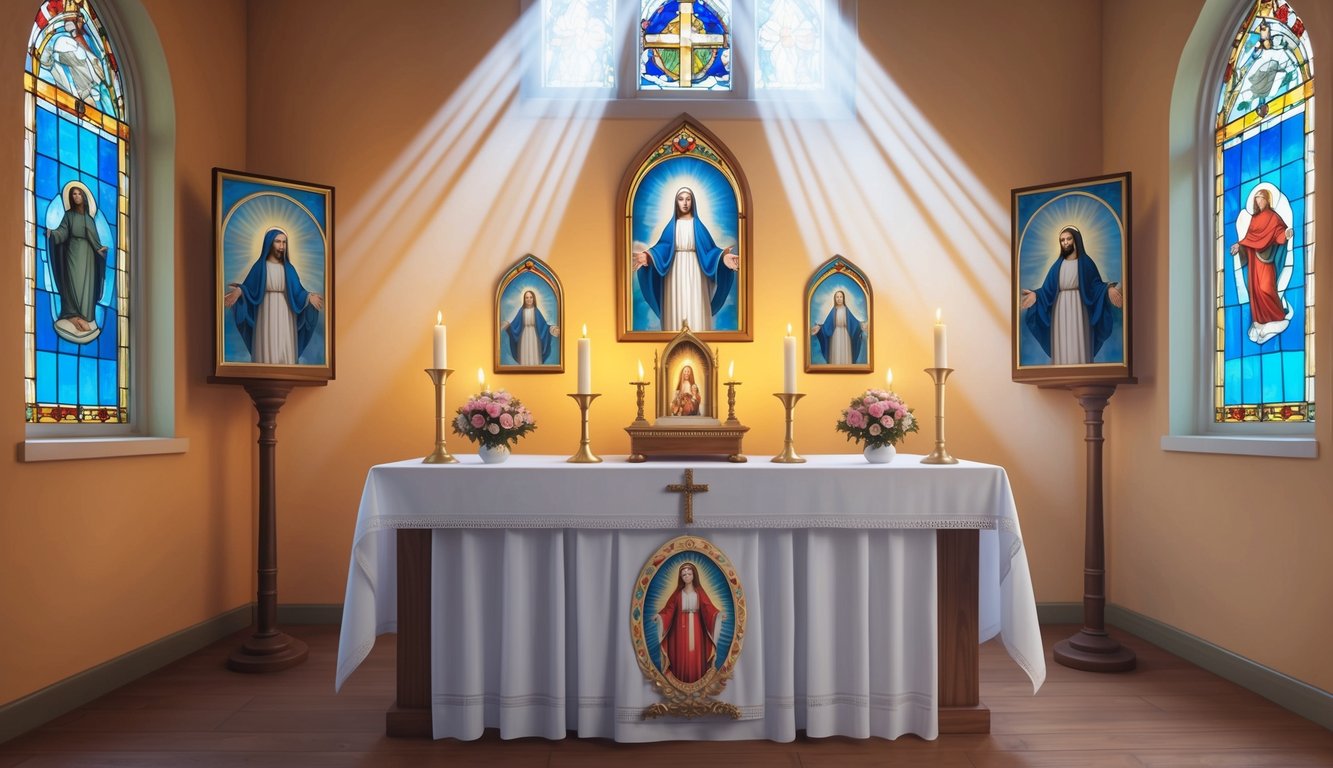Don’t Miss Out On This Unique Astrological Opportunity
Are you tired of spinning your wheels and getting nowhere? Simply put, you’re out of sync: you’re out of alignment with your astral configuration.
But: there’s a kind of map that can help you reclaim your alignment. Think of it as your own personal blueprint to success and happiness: a blueprint that will help you live your most amazing life.
Get started here.
The novena to the Divine Mercy is a powerful prayer that spans nine days.
It invites you to meditate on the mercy that Jesus offers to all. This devotion encourages you to open your heart to Divine Mercy.
Through these reflections, you can deepen your spiritual understanding and strengthen your relationship with Jesus.
St. Faustina, a Polish nun, was entrusted with spreading this message of mercy.
The novena invites you to pray for different groups of people, from souls in purgatory to those who have lost their faith.
Embracing this prayer can transform your outlook and bring peace to your soul.
Taking part in the novena to the Divine Mercy can impact both individuals and the Church community.
By dedicating time to this devotion, you become part of a larger movement centered on kindness and forgiveness.
This enriches not only your life but also the lives of those around you.
Key Takeaways
- The novena focuses on mercy themes like forgiveness and compassion.
- It is rooted in the message entrusted to St. Faustina by Jesus.
- It enhances spiritual growth and impacts both individual and communal faith.
The Essence of Divine Mercy
The Divine Mercy devotion highlights key themes like mercy, trust, and compassion.
Based on the compassionate heart of Jesus, it encompasses theological foundations, teachings of St. Faustina, and the principles of trust and compassion.
Theological Foundation
At its core, the theology of Divine Mercy focuses on God’s mercy available to everyone.
It is rooted in the teachings of Jesus, who emphasized love and forgiveness.
The chaplet of Divine Mercy and the image of the merciful Jesus symbolize this.
God’s mercy is described as an “ocean” that overflows with graces for all mankind.
This unlimited compassion invites people to trust in divine love and grace, encouraging them to share it with others.
St. Faustina’s Role in Divine Mercy
St. Faustina Kowalska, a Polish nun, played a vital role in popularizing the Divine Mercy devotion.
Her diaries, including the Diary of St. Faustina, detail her visions of Jesus, who asked her to spread the message of mercy.
She promoted the Divine Mercy image, feast day, and novena.
Her writings and actions helped foster a deep trust and understanding of God’s boundless compassion and mercy.
Her impact continues to be felt, inspiring devotion worldwide.
Trust and Compassion
Trust and compassion are key elements of the Divine Mercy message.
Jesus emphasized the need for trust in His infinite mercy.
This trust helps one surrender fears and doubts.
Compassion, on the other hand, encourages acting with love and kindness towards others.
Embracing these virtues can transform your spiritual life, allowing you to experience graces and share them with others.
The compassionate heart of Jesus is central, guiding believers to embody mercy in their daily actions.
Practicing the Devotion
Practicing the Devotion to Divine Mercy involves specific prayers and observances that foster a deep spiritual connection.
Key components include the Divine Mercy Novena, the Divine Mercy Chaplet, and Divine Mercy Sunday, each serving unique purposes and practices.
Divine Mercy Novena
The Divine Mercy Novena begins on Good Friday and spans nine days of dedicated prayer.
Each day centers on special intentions, such as praying for the souls of priests and religious or the souls of little children.
The novena focuses on the love and mercy of Jesus, guiding you through structured prayers that seek His divine help and compassion.
The novena for the dead is a powerful way to intercede for the souls of departed loved ones, asking for God’s mercy and peace.
Through this devotional practice, believers find comfort in trusting that their prayers can aid the faithful departed on their journey to eternal rest.
By embracing the novena’s prayers and reflections, one can deepen their faith while seeking solace in God’s infinite love.
By reciting the novena, you spiritually prepare to receive and show mercy.
This practice encourages you to reflect on your own life and how you can extend mercy to others.
The Divine Mercy Novena is a rich, meaningful way to deepen your spiritual practice.
Divine Mercy Chaplet
The Divine Mercy Chaplet is a powerful prayer that can be recited using a rosary.
This chaplet includes specific prayers and intentions, highlighting the importance of mercy during the hour of death and seeking God’s compassion for the world.
You can recite the Chaplet daily, especially during the three o’clock hour, known as the Hour of Great Mercy.
This is a sacred time to turn your heart to Jesus’ suffering and ask for His mercy on you and the whole world.
This practice reinforces the themes of love and forgiveness central to the devotion.
Divine Mercy Sunday
Divine Mercy Sunday is celebrated on the Sunday after Easter.
This day is devoted to understanding and embracing the mercy of Jesus.
Participating in this event involves attending Mass, receiving communion, and engaging in prayerful reflection on God’s mercy.
Special indulgences are available on this day when you fulfill certain conditions like prayer and acts of mercy.
Celebrating Divine Mercy Sunday encourages you to make mercy a central part of your life, influencing your actions and interactions.
This observance invites a deep appreciation for God’s boundless love and compassion.
Impact on Individuals and the Church

The novena to the Divine Mercy offers a pathway to deep personal growth and can strengthen the unity and mission of the Church.
By exploring both personal transformation and the role of this novena in church life, you’ll understand its broad impact.
Personal Transformation
Through the novena, you can experience profound personal change.
Participating in this devotion encourages you to deepen your faith and reliance on the mercy of God.
It invites you, especially as humble souls, to embrace the hope of salvation through a regular practice of prayer and reflection.
Engaging in the daily prayers of the Divine Mercy inspires acts and deeds of mercy.
This leads you to seek forgiveness and show compassion to others.
This spiritual practice isn’t just about personal growth; it fosters a community that values empathy and understanding, enhancing your connection to both God and others.
Role in the Church
Within the Church, the novena serves as a unifying force.
By focusing on mercy and compassion, it strengthens the unity of the church.
It calls on church members to actively participate in deeds of mercy, spreading positivity and understanding throughout the community.
The practice helps the Church’s mission of fostering spiritual growth and community development.
By aligning with the Church’s teachings, it supports ongoing evangelization efforts, encouraging followers to live out their faith through action.
Participation in the Divine Mercy devotion thus brings people together, reinforcing a collective mission and shared values.
Frequently Asked Questions

The Divine Mercy Novena is a tradition that involves specific prayers and intentions over nine days.
It can be started at different times, and its prayers hold special significance, especially the 3 o’clock prayer.
How do you perform the Divine Mercy Novena?
To perform the Divine Mercy Novena, you pray specific prayers each day for nine days.
This involves reciting the Divine Mercy Chaplet as well as focusing on particular intentions daily.
You may also attend church services if available, but the novena can be done alone or in groups.
What prayers are included in the Divine Mercy Novena?
The Divine Mercy Novena includes the Divine Mercy Chaplet and additional unique prayers for each of the nine days.
These prayers are specifically designed to reflect themes of mercy and forgiveness.
They place a strong emphasis on asking for God’s mercy and reflecting on it through various meditations.
Can the Divine Mercy Novena be started at any time or is there a specific start date?
Traditionally, the Divine Mercy Novena begins on Good Friday and ends on Divine Mercy Sunday.
Though it is customary to follow this schedule, you can start the novena at any time if needed.
The important part is your intent and dedication during the nine days of prayer.
What are the intentions associated with each day of the Divine Mercy Novena?
Each day of the Divine Mercy Novena has specific intentions, focusing on different groups of people.
These include prayers for sinners, priests, devout souls, those who do not believe in God, and others.
These intentions guide you to reflect on mercy and compassion for diverse communities.
What is the significance of the 3 o’clock prayer in the context of the Divine Mercy Novena?
The 3 o’clock prayer holds special importance as it commemorates the time of Christ’s death.
In the context of the Divine Mercy Novena, this prayer is a call to remember Jesus’ sacrifice and ask for His mercy.
It’s a moment of reflection and connection to the themes of the novena.
In what ways does the Divine Mercy chaplet differ from the novena?
The Divine Mercy Chaplet is a shorter form of prayer.
It is intended for daily recitation.
On the other hand, the novena spans nine days.
It includes specific intentions and prayers each day.
While the chaplet is part of the novena, it can also be prayed on its own daily to seek Divine Mercy.



